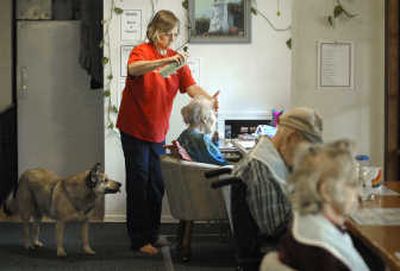Insurance costs hurt adult family homes

Operators of some adult family homes in Washington say they are struggling to afford state mandated professional liability insurance.
The insurance is required for about 2,200 adult family homes across the state that have contracts to care for low-income elderly and disabled people on Medicaid. The homes are licensed for two to six residents each and operate as small businesses, while providing 24-hour care.
“A lot of homes have already closed, and a lot of other homes are switching to private pay only, which bounces the Medicaid people right into a nursing home,” said Carol Carroll, who owns an adult family home in Spokane Valley that provides care for six residents.
Carroll said she already buys clothing, toiletries and diabetic foods for her cash-strapped residents, along with the mortgage, utilities and other expenses. The insurance will add another $2,300 to $5,000 a year to the tab.
“Just my grocery bill alone is through the roof,” Carroll said. “Something has to happen pretty soon, or we’re all in trouble.”
The problem isn’t that the insurance is a bad idea, adult family home operators say, but that it’s an additional burden when they’re already dealing with Medicaid reimbursement rates that don’t begin to address skyrocketing costs for everything from groceries to heat.
“It’s a good business practice. I don’t disagree with that. But (the insurance) has to be affordable, and there has to be funding for it,” said Amy Thomas, co-founder of Save Our Homes, a group that organized a drive to collect signatures from people opposing the insurance requirement. So far, 200 adult family home operators across the state have signed the petition, along with families and other caregivers, she said.
Thomas said the insurance benefits the state but doesn’t provide any additional protection for policyholders.
Bea Rector, of the Aging and Disability Services Administration division of the Department of Social and Health Services, said the state has 5,500 Medicaid clients in adult family homes.
“Obviously, it’s an important long-term care resource,” Rector said of the homes.
Liability insurance is a reasonable requirement for any business contracting with the state, said Rector, who is based in Olympia.
“Without liability coverage, it puts the state in the position of being the default insurance provider.”
Nearly 1,000 homes throughout the state are already insured. Because some insurers won’t provide coverage for homes that care for people with severe behavioral issues or the coverage is too expensive, Rector said, the state sometimes provides individual waivers.
Originally, the state, which requires all its contractors to carry liability insurance, required that the adult family homes have coverage of $1 million per incident and $2 million aggregate. When the insurance proved too costly and difficult to obtain, the state waived the requirement.
Now policies covering up to six residents start at about $2,150 for the first year and $1,400 per each year after, Rector said. So, the state sent out a letter this spring asking providers to get the insurance by July of this year. They also lowered the amount of coverage required by half.
“We’ve been working really hard to create low-cost insurance alternatives,” said Rector, who also recognizes that the state has an ongoing responsibility to re-evaluate the rates they pay long-term care providers.
Carroll said she primarily lives off of $700 a month disability from her days of working at Kaiser Aluminum.
“I’ve been negative on my last four tax returns because my tax man keeps asking me why I keep doing this,” Carroll said.
Thomas said the requirement penalizes homes that accept low-income clients. The homes save the state money by providing a higher level of service for clients who would typically require nursing home care, she said, yet those small businesses make less than half as much per day than a nursing home providing the same care. The insurance requirement piles on an extra burden.
“Because our rates are so low, we can’t afford this additional requirement,” Thomas said. “We’re definitely a community service, but we’re not volunteers.”